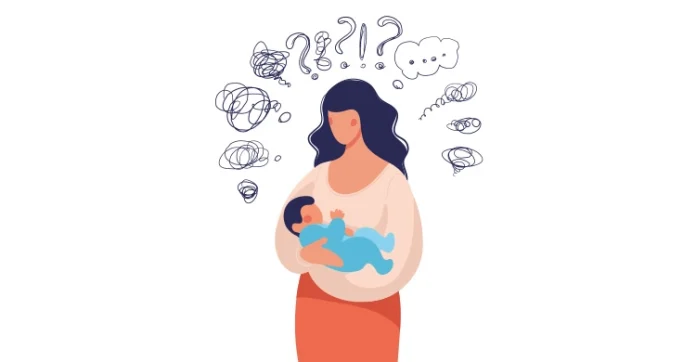Welcoming a new baby into your life can be an extraordinary journey, mingled with a tinge of fear and uncertainty. Your world is transforming, and with it, everything you know to be true. But even with all the preparations, postpartum depression can still take you by surprise. Remember, it’s okay to ask for help and nurture your mental health.
Postnatal depression is a serious issue affecting women globally, with an estimated 1 in 7 experiencing postpartum depression. The statistics are even higher in India, where approximately 1 in 5 women are affected.
Unfortunately, the COVID-19 pandemic has worsened the situation, with around 46% of women who contacted Nimhan’s helpline during the pandemic showing signs of postpartum psychosis.
About Dr Supriya Agarwal
Dr. Supriya Agarwal brings over a decade of experience as a medical professional and specialist in adult CMHT. With a distinguished background in academia, Dr. Agarwal served as an Associate Professor at Subharti Medical College in India.
She is a life fellow of the Indian Psychiatric Society and a member of the Marce Perinatal Society. As a leading voice on positive mental health and parenting, Dr. Agarwal shares her insights and knowledge on her blog, bodymindheal.wordpress.com.
She also previously served on the Young Psychiatry Subcommittee and Sexual Disorder Subcommittee of the Indian Psychiatric Society.
Understanding What is Postpartum Depression With Dr Supriya Agarwal
hellomyyoga: What are the physical and mental changes a woman goes through during Postpartum?
Dr. Supriya: Pregnancy is a transformative experience that lasts beyond the 9-month term.
- While the joy of motherhood is unrivaled, it’s important to note that some physical changes can linger. From afterbirth pains and vaginal discomfort to swollen breasts and hair loss, new moms should be prepared for these temporary bodily shifts.
- Talking at a psychological level, after pregnancy, women undergo a rollercoaster ride of emotions due to extreme hormonal shifts. The drop in estrogen levels can result in mood swings and unpredictability. However, establishing a routine with their newborn can help balance out these emotional changes. New moms shouldn’t worry too much, as these feelings are normal. Take comfort in knowing that it’s common to experience a range of emotions during this time.
hellomyyoga: What does Postpartum timeline mean? Is it different for every woman?
Dr. Supriya: Postpartum is the period that begins followings the completion of labor and following delivery. Some classification systems classify it from 1 year post-delivery, others as 2 years period.
hellomyyoga: Why should Men know about Postpartum Depression?
Dr. Supriya: As families evolve from extended to smaller nuclear units these days, a husband’s role in supporting his wife during postpartum depression has grown even more critical. Your wife requires your unwavering support and understanding during these trying times, and it’s up to you to remain strong for your new baby.
- As a loving and supportive husband, a man can be the rock that helps his wife overcome postpartum depression. If he notices any of the symptoms associated with Postpartum Depression, he must offer her support. Remember, Postpartum Depression is a medical condition that can be treated effectively with the help of a professional.
- Many women struggle silently with postpartum depression, unaware of how to ask for help or even that they are experiencing a problem. But even if they don’t realize it, they often subconsciously reach out for assistance. Recognizing these subtle “calls for help” can make a huge difference in their journey toward healing.
- The conversation is always the best place to start. Have a heart-to-heart with your spouse and express your thoughts on what’s going on. Avoid becoming defensive or attacking your wife, as this will only make things worse. It’s vital to understand that she’s not doing it on purpose and needs your love and understanding more than ever.
hellomyyoga: Is Postpartum Depression the same as Baby Blues, Postpartum Anxiety, and Psychosis? If not, what approaches exist to effectively treat these conditions?
Dr. Supriya: The symptoms in the puerperal period can vary in intensity and severity ranging from mild anxiety to severe incapacitating anxiety, and postpartum blues which simply means a cluster of emotional and reactive physical symptoms within a week of delivery, lasting for 1-2 weeks mostly, and is self-limited. This is present in one of two women and does not require treatment with medication, but understanding and support.
- In contrast, Postpartum Depression is a more severe and functionally impairing mental disorder with symptom clusters including low mood, emotionality, reversal of sleep and appetite, negative thoughts about, self, baby, and the world. With Postpartum Depression the risk of worsening and rapid deterioration increases, thus women may require hospitalization and antidepressant treatment. This may begin within the first 4 weeks postpartum to any time within 1 year.
- Postpartum psychosis is the most severe form of puerperal mental health disorder occurs in less than 1 in 1000 women and has significant risks to mother and baby, including the risk of suicide, self-neglect, and neglect of mother and baby. Postpartum psychosis should be treated in specialized PP centers and requires a medication approach.
hellomyyoga: What strategies would you suggest to a man and the family as a whole to help a woman recover from Postpartum Depression?
Dr.Supriya: Postpartum depression is treatable, and mums should not be blamed for depression. Postpartum Depression is not due to witchcraft or because the new mum is not trying hard enough, it is a medical disorder with functional impairment of the new mum and thus requires assessment and treatment. This is how a family and a husband can help:
- Recognizing signs and symptoms of Postpartum Depression
- Being aware and open to the idea of seeking help from professionals
- Providing practical non-judgemental and noncritical support to mum
- Seeking medication advice and adherence to medical treatment
- Good nutrition, sleep, hygiene, and strong family support is the key to managing Postpartum depression.
hellomyyoga: What holistic healing methods would you recommend especially to a single mother to relieve stress, anxiety, and fears?
Dr.Supriya: Single motherhood can seem very overwhelming and frightening. Although, parenting for young ones can seem like a roller coaster ride; the various ways one can manage stress and anxiety are planning ahead, organizing and scheduling days, and weeks of activities in advance, having a mother/peer group support network, giving oneself some time to relax rejuvenate, light exercise, mindfulness, deep breathing, and relaxation techniques, being kind and compassionate to not only baby but also to oneself is the key.
Read More from ‘Chat On The Mat‘
- Drugless Healing For Knee Osteoarthritis: Healthy Knees With Dr. Vineeta Ketkar
- Beyond the Surface: A Deeper Look at Emotions with Fharzana Siraj
- “You Are Never Too Weak and Old.” Breaking Mind Barriers With Dr N Ganesh Rao
- How to Navigate Depression in Relationships? Understand With Prasad Rangnekar



